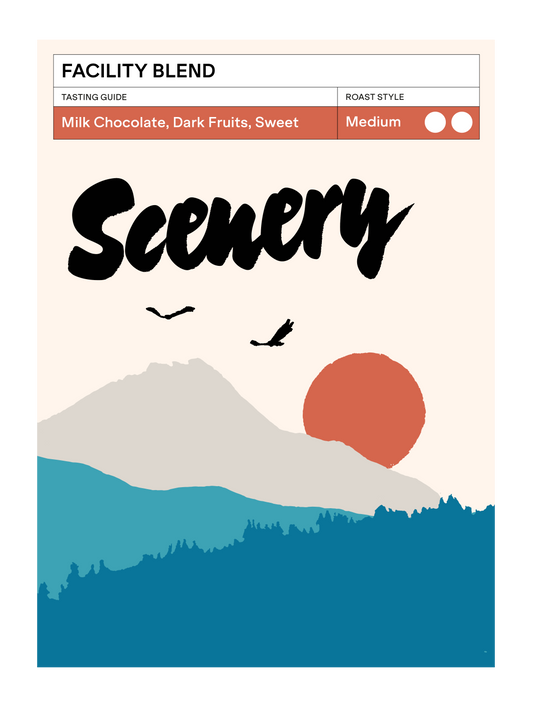Yesid's process-forward Rosado lot, a single producer seperation from the El Carmen co-op ran from 17/04/2024 to 03/07/2024
We featured a Camioneta Anoxic Washed Rosado lot from Asociación Agropecuaria El Carmen de Acevedo as one of our very first single origin coffees as a roastery. We’re bringing it back, with a single producer separation from El Carmen.
Both Camioneta and Anoxic processing are progressive value-add steps developed by import partners Raw Material that increase the complexity and quality of coffee, whilst returning higher prices to the producers - something we value highly with our sourcing.
Brew Guide:
Best Brewed with: Filter
Best Rested: 3-4 weeks
Coffees with heavier amounts of in-cherry fermentation tend to grind and brew in a manner than causes very fast draw-downs and brew times on filter. We’re also roasting this super light to prevent any roast-related off-notes from the fermentation. So feel free to grind finer than you usually would, but matched with a lower water temp
Filter: 60-62g/L, 93c Water, Finer Grind
Espresso: 18g, 48g, 26-30s
We’re tasting:
A heavier amount of process characteristics, which when combined with the Rosado variety’s genetic expression produces a very purple-fruit forward cup. Blackcurrant, quince jam and jammy red wine (with winey aromatics alongside dense violet florals). The finish reminds us of purple boiled sweets and milk chocolate.
Traceability
Country of Origin: |
Colombia |
Region: |
Grown in Higuerón, Huila, Processed in Caldas |
Producer |
Yesid Vargas, a member of Asociación Agropecuaria El Carmen de Acevedo |
Farm: |
Finca El Ventilador, Processed at Jamaica Processing Station, Villamaría |
Variety: |
Rosado |
Elevation: |
1600 MASL |
Process: |
Camioneta Anoxic Natural: Ripe cherries picked at El Ventilador, placed in clean sealed grainpro bags and driven via truck (“Camioneta”) to the Jamaica station in Caldas, a 3 day journey. On arrival, cherries are washed with cool water and floated to remove underripes. Cherries drained and dried as a natural on raised beds in a solar drier over 20 days before finishing in mechanical driers |
Import Partner: |
Raw Material |
Harvest: |
Crop 23/24, Arrived UK Oct 23 Second Year Purchasing from El Carmen and its members. |
The Story:
Yesid Vargas owns the 11 HA El Ventilador in El Higuerón, Huila, and has built a reputation for his Rosado (a contraction of “Borbon Rosado”) as an early adopter of the variety. The farm is named for the relatively constant winds that rush through the valleys it is located in, which requires shade trees and wind-breaks to ensure coffee blossoms are not blown off the trees during flowering.
Retiring from the Colombian national army having been a victim of a landmine, Yesid has tended to the farm for over 30 years - employing 10 people year round and up to 30 in peak harvest periods. He has focused on speciality production and quality, and has built a reputation - especially with roasters based in America - for the consistent output of his coffee.
As a member of the El Carmen co-operative, Yesid has benefited from both local support as well as the continued partnership with our import partners Raw Material - access to continued training, a local QC lab, stable above-market pricing and international market access. While some of his coffees may have previously been blended into wider co-operative lots, recent efforts from the Carmen-RM partnership has seen single producer lots separated when they display high quality - returning an additional premium to the producer.
Raw Material have been pioneers of simple, low capital expenditure value addition, taking learning from their experimental farm and training centre Finca El Fénix and adapting it to other regions and countries. One such technique is the Anoxic Water Pillow method, a processing technique we’re featuring with the Shyira Anoxic lots. This technique allows for low oxygen, cooler extended cherry fermentations using existing washing station infrastructure.
Raw Material make heavy use of the technique at their Villamaría station in Caldas, so in order to allow producers in Huila to access the value-addition, cherries must first be transported across the provinces. The 3 days this takes acts as an initial dry-fermentation stage, contributing to some of the heavier and darker fruit notes and process characteristics.
We’re huge fans of processes that allow for value addition and capture in-country, especially when they require low-investment or risk for the producers - we see it as a win-win in terms of producing excellent high quality and unique coffees, alongside the ability for us to pay more for coffee.

![[21] Colombia - Yesid Vargas Camioneta [CROP 23/24 ARCHIVE]](http://scenery.coffee/cdn/shop/articles/colombia_yesid_vargas_camioneta_shopify_1.png?v=1721909089&width=1100)



![Colombia - El Jaragual Espresso [25/26]](http://scenery.coffee/cdn/shop/files/colombia_el_jaragual_espresso_2526_shopify.png?v=1752837490&width=533)


![Colombia - El Jaragual Caturra [25/26]](http://scenery.coffee/cdn/shop/files/colombia_el_jaragual_caturra_2526_shopify.png?v=1753431368&width=533)

![Kenya - Gatomboya AA [24/25]](http://scenery.coffee/cdn/shop/files/kenya_gatomboya_2425_shopify.png?v=1753431166&width=533)


![Guatemala - Familia Primavera [24/25]](http://scenery.coffee/cdn/shop/files/guatemala_familia_primavera_2425_shopify.png?v=1751223203&width=533)
